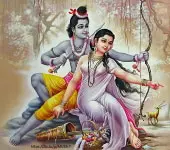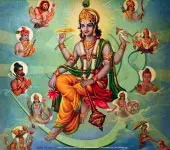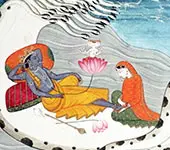Ravana's mistake
Click above to listen as audio.
Wedding of Ahalya and Gautama
Brahma created Ahalya as the most beautiful woman in the world. He then gave her to Rishi Gautama. Ahalya was brought up by Rishi Gautama. When Ahalya became of marriable age, everyone wanted to marry her. Indra was the foremost among them. But Brahma, appreciating Gautama’s integrity and self-control got her married to him.
Who is the son of Ahalya and Gautama?
Shatananda.
Quiz
Jaya Jaya Rama Krishna Hari - which sampradaya is the mantra connected with?Transcript
(Click here to read more)
We saw why Sri Hari takes avataras. There can be multiple reasons. Some of them we know, some we may not even know or can conceive, understand. In the same way, the prompt, the exact moment when he decides to take avatara. Or how he says that: ok, now I will take care of it; this can also vary from version to version of Ramayana. Why are there different versions? Mainly because of differences in perceptions. For example, you take Adhyatma Ramayana, you will see that throughout Adhyatma Ramayana, the emphasis is on the principle that Lord Rama is....
Transcript
(Click here)
We saw why Sri Hari takes avataras.
There can be multiple reasons.
Some of them we know, some we may not even know or can conceive, understand.
In the same way, the prompt, the exact moment when he decides to take avatara.
Or how he says that: ok, now I will take care of it; this can also vary from version to version of Ramayana.
Why are there different versions?
Mainly because of differences in perceptions.
For example, you take Adhyatma Ramayana, you will see that throughout Adhyatma Ramayana, the emphasis is on the principle that Lord Rama is Paramatma, what he performed here through his shakti called Seetha Devi is just maya.
In Valmiki Ramayana, we see more of the Purushottama aspect of Lord Rama.
The perfect man, how a man can be perfect.
All these versions, they only complement each other.
They don’t contradict each other.
They are like different views of a building, the elevation, floor plan.
When you have these different views only you get a complete idea about the building.
You can see the building right in front of you.
But if you want to talk about it, discuss it with an engineer who is elsewhere, who is not able to see it physically, you can still do it.
By emailing him the different views.
The more the number of views, he will get a better clarity
You can’t just take a pic in your mobile, send it to him, and expect him to advise you about the dimensions or structure of the building.
A floor plan will look completely different from an elevation.
But they are ultimately talking about the same building.
Only different perspectives.
The different versions of the Lord’s story also you can use in the same way.
Don’t look for differences.
Try to integrate them.
We will now look at how Valmiki Ramayana’s narration of how the lord conveys that he will take avatara.
The Putreshti of Dasharatha was going on.
Rishyashringa was the officiating priest.
Putreshti just followed Ashwamedha yaga, Ashwamedha was done first.
All the Devas assembled there.
In any yaga, Devas are invited to receive their own portions of the offerings made.
Only those who are invited come to the yagavedi.
This is specified before the commencement of the yaga, that in this yaga, these are the Devatas who will be given offerings.
This is the invitation.
Accordingly, they come.
Those who are not invited will not come.
It is also not that every Devata will get an equal share.
Depending on the extent of the role of the particular Devata in manifesting the expected result of the yajna, their share of offerings will also vary.
The bigger the yaga, the more will be the number of Devatas invited.
Here in Putreshti, so many Devatas were present,
Brahma was also present.
The other Devas told Brahma.
This Ravana has made life difficult.
Because of your boon to him, your blessings to him that he can not be killed by us.
We can’t even try to overpower him because of our respect for you.
We have to honor the promise that you have given him.
We will not attempt to violate the boon that you have given him.
Understand this clearly.
It is not that Devas are incapable of eliminating Ravana.
They are still very much capable of that.
But they won’t do it because they are bound by Brahma’s promise.
They are saying that they are tolerating whatever he is doing.
Sarvam tasya kshmamahe.
So don’t be under the impression that Ravana simply overpowered all of them.
And because of the arrogance that he can not be killed, what is Ravana doing?
Terrorizing the three worlds.
He hates and harasses the Lokapalas, the protective Gods: Indra, Agni, Yama, Nirruti, Varuna, Vayu, Soma, Ishana.
He wants to remove Indra from his place as the king of Gods and occupy that seat himself.
He harasses not only us, Rishis, Yakshas, Gandharvas, Brahmanas, and even Asuras.
Ravana is a Rakshasa, he is harassing Asuras also, the sons of Diti and Danu.
Asura is a common term used for anyone who is not a Sura, in that sense, even Rakshasas are Asuras
असुषु रमन्ते इत्यसुराः
Their thinking, their world is limited to what can be experienced with the body, the sensory organs.
Their only activity is the pampering of their sensory organs.
Which has made them utterly selfish.
They want to go to Swarga, not to do anything good unlike the Devas.
Surya sits in Swarga, gives light and heat to the world.
Vayu sitting in Swarga is breathing air.
If asuras come to Swarga they won't do any of that.
They just want to enjoy the pleasures in Swarga.
But here, Ravana is terrorizing and torturing even the other Asuras.
Other than rakshasa all the other Asura vamshajas.
Devas request Brahma for a solution to this.
They can't do anything on their own.
Because they are bound by Brahma's words.
Brahma thinks for a while and says.
There is a way.
When Ravana asked for that boon from me do you know what exactly he said?
He said I should be avadhya, I should not be killed by Gandharvas, Yakshas, Devas, Danavas, and other Rakshasas.
He didn’t say human beings.
He thought human beings are weaklings.
They can anyway not kill him.
So he didn’t specifically include humans in his list.
Because of avajnana, avajna.
He never thought of humans as a serious threat.
So he didn’t take their name.
That means humans can still kill him.
All others are restrained by my boon.
Again, understand that it is not the incapability of Yakshas and Gandharvas.
They are restrained by Brahma's word.
So, Ravana can be killed by a human being.
This is going to be the way ahead.
This made all the Devas present there happy.
This is another thing.
Whenever a boon is asked for, you have to spell it out.
It is like the technical specifications of a computer.
You can’t just say that this computer has everything.
This is the best.
You have to specify everything.
Like what CPU, how much RAM, what hard disk.
Ravana could not have said: nobody should be able to kill me.
Then Brahma would have said: that is not possible, be more specific.
Because that kind of a broad boon even Brahma will not be able to give.
So, Ravana gave a list of all those whom he thought were serious threats.
And he never thought that human beings can ever be a threat to him.
And invariably, all these boons will also have a built-in catch.
Like how it happened in this case.

English Topics
Ramayana
Click on any topic to open
- 50 Janaka's Spiritual Evolution - From Jnana to Bhakti
- 49 Dasharatha's Grief Decoded
- 48 Shiva burned Kamadeva at Chhapra, Bihar
- 47 Motherhood brilliance - Kausalya Supraja Rama
- 46 Bala and Atibala Mantras - Sriram Ji will unfold their superpower
- 45 Dasharatha Pleads With Vishwamtra Not To Take Away Young Sriram Ji
- 44 Abandoning Of Sita Devi - Is It Justifiable?
- 43 Vishwamitra Wants To Take Young Sriram Ji With Him
- 42 Position Of Sages In Ancient Bharata
- 41 Horoscope of Sriram Ji
Please wait while the audio list loads..
30
Ganapathy
Shiva
Hanuman
Devi
Vishnu Sahasranama
Mahabharatam
Practical Wisdom
Yoga Vasishta
Vedas
Rituals
Rare Topics
Devi Mahatmyam
Glory of Venkatesha
Shani Mahatmya
Story of Sri Yantra
Rudram Explained
Atharva Sheersha
Sri Suktam
Kathopanishad
Ramayana
Mystique
Mantra Shastra
Bharat Matha
Bhagavatam
Astrology
Temples
Spiritual books
Purana Stories
Festivals
Sages and Saints




